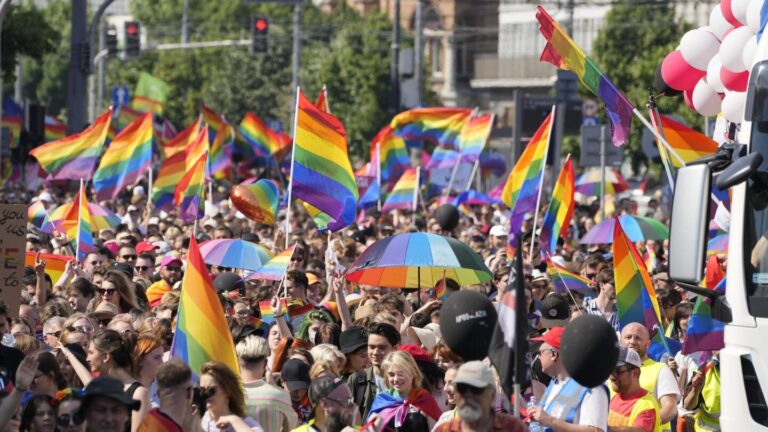WARSAW, Poland (AP) — Central Europe’s largest gay pride parade returned to Warsaw for the first time in two years on Saturday after a pandemic-related interruption and amid a backlash against LGBT rights in Poland and Hungary.
This year’s equality parade marks 20 years since it was first held in the Polish capital – it was originally banned twice by the conservative mayor over concerns it promoted homosexuality and was cancelled last year due to the coronavirus pandemic.
Warsaw Mayor Rafal Truszkowski led the parade in a show of support for LGBT rights, joining thousands of people waving rainbow flags from apartment balconies and sidewalk cafes.
But that level of acceptance is not universal in Poland, a largely Catholic and conservative country.
The joyous and colourful celebrations were coloured by uncertainty about the future of rights for gay, lesbian, bisexual and transgender people after setbacks first in Russia and now in Hungary.
“Parade day is always a bittersweet moment for our community,” said Rafal Wojciak, a spokesman for the organizers, who spoke of a sense of sadness and helplessness that LGBT people have not won rights like same-sex partnerships and marriage in Poland and face new threats.
The parade took place just days after Hungary’s parliament passed a law making it illegal to show any material related to LGBT issues to anyone under the age of 18.
Hungary’s conservative ruling party has positioned the law as an effort to combat pedophilia, but rights groups say it will stigmatize LGBT people and prevent young people from accessing important information.
Poland’s populist ruling party has a similar political line to Hungary’s Prime Minister Viktor Orban’s government, which has promoted conservative policies and strengthened its control over the courts and media. The European Union has criticized both countries, accusing them of eroding democratic norms.
Prominent Polish activist Bart Staszewski carried the Hungarian flag at a march on Saturday, saying it was a message to the EU to protect LGBT people because he fears “Poland will be next.”
One participant was Mischa Czerniak, a 37-year-old musician who was born in Russia and moved to Poland 10 years ago to escape homophobia in his country. Czerniak said the recent scapegoating of LGBT people by Polish authorities reminded him of Russia, especially local anti-LGBT resolutions that “create an atmosphere of hatred, suspicion and fear.”
“The shift to the right has made Poland feel closer to my home country than I would have liked, and made me question why I moved here,” he said.
Ambassadors and diplomats from 14 embassies in Warsaw also participated. U.S. Charge d’Affaires “Let’s choose love over hate,” tweeted Bix Aliu.
A year ago, Poland’s LGBT community faced a backlash from conservative politicians in the ruling party, local communities and churches when President Andrzej Duda was re-elected against a challenge from Truszkowski, declaring that “LGBT are not people, they are an ideology” and claiming that LGBT is “more destructive than communism.”
A Polish archbishop has warned of a “rainbow plague”, and dozens of Polish local governments have passed resolutions against “LGBT ideology” in the name of protecting traditional families, which have been strongly condemned by EU officials and some have been withdrawn.
“We have been through very difficult times, but at the same time we are taking to the streets to say that we are stronger and we are not going to give up,” said Miroslava Makhovska, deputy director of the Campaign Against Homophobia.


